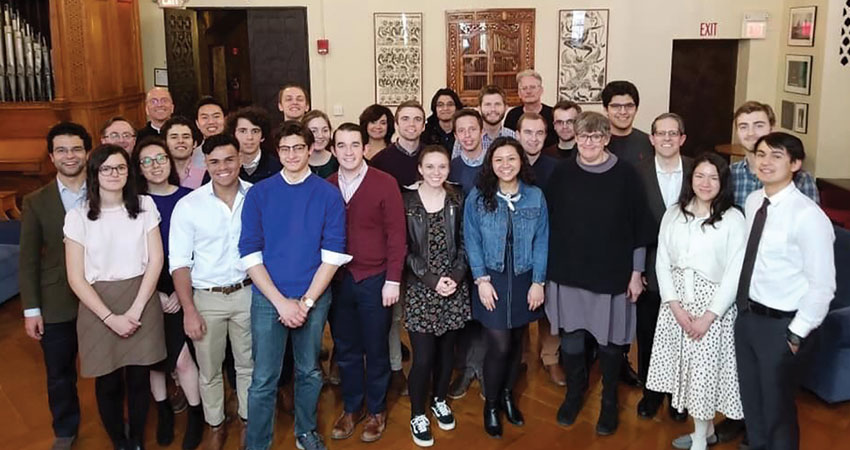Symposium Explores Arguments for Virtue, Chastity, and Sexual Ethics
By Catherine Elvy, Staff Writer
The Harvard Anscombe Society recently paid tribute to the the remarkable contributions of its namesake while celebrating the 100th anniversary of her birth.
In March, about 50 students, alumni, and other associates attended the 2019 Harvard Anscombe Symposium to honor the life of British intellect Gertrude Elizabeth Anscombe. At the gathering on March 16 in Adams House, participants explored Anscombe’s writings on the philosophy of mind, action, and intention, plus her modern arguments on behalf of virtue, chastity, and sexual ethics.
In March, the Harvard Anscombe Society celebrated the 100th anniversary of the birth of its namesake.
When she died at 81, Anscombe was considered by some to be the greatest English philosopher of her generation.
“She is a huge, towering figure,” said Will Long ’19, co-president of Harvard Anscombe Society (harvardcollegeanscombesociety.wordpress.com). “She is an example to be followed. She was not afraid to be incredibly principled.”
Symposium participants received a hefty packet of some of Anscombe’s marquee materials, including Modern Moral Philosophy and Intention, prompting a series of stimulating discussions with world-class faculty. Conference participants included a dozen-plus students and alumni from top universities.
Among them, Christian Say, Princeton ’17, called Anscombe a “real giant” in the world of analytic philosophy. As such, “it was really cool to see students from all backgrounds engaged with Anscombe’s philosophy,” said Say, a project manager in Cambridge, Massachusetts.
“She was also an inspirational Christian who truly stood up for what she believed in, often in very public, but still incredibly thoughtful ways.”
Conference presenters included Harvard lecturer and philosopher James Doyle, who has been on the faculties of major U.S. and U.K. universities, and Father Jeffrey Langan, Columbia M.A. ’94, philosopher and priest of the Prelature of Opus Dei.
The event also featured University of Chicago philosopher Candace Vogler, a principal investigator on the Virtue, Happiness, and Meaning of Life project.
Among other speakers, Oxford and Cambridge educated Peter Wicks is a scholar-in-residence at the Elm Institute in New Haven, Connecticut. The philosopher, author, and editor served as a visiting fellow at Princeton University before pursuing doctoral studies at the University of Notre Dame.
As for Anscombe, the gifted, Oxford-educated scholar married notable philosopher Peter Geach in 1941, and became a professor of philosophy at Cambridge in 1970. The controversial and colorful figure and mother of seven served until her retirement in 1986. On the historic campus, associates remembered Anscombe for sometimes smoking cigars and wearing a monocle.
In addition to her extensive credentials, Anscombe is known for her conservative views on sexual ethics and opposition to abortion. In a nod to the 20th century philosopher’s moral passions, student organizations bearing her name promote traditional marriage, sexual integrity, and the significance of the family.
At their core, the student organizations honoring Anscombe’s legacy use reason and decorum to defend traditional family values. Anscombe, a prolific author, wrote that casual sex dishonors the body.
Given Anscombe’s intellectual stature, Long and his Harvard colleagues wanted to give students involved in Anscombe organizations better insights into the ethicist’s writings, values, and life. “It was a really good opportunity for a lot of people to get together, learn about Anscombe, and build friendships,” said Long.
An obituary in Philosophy Now: A Magazine of Ideas wrote that Anscombe “saw no reason to shut up about moral matters.” The 2001 article also noted the devout figure’s “unfashionable views” on ethics reflected her Christian faith. “She boldly and brilliantly defended unfashionable and unpopular beliefs,” the journal noted. “Despite her efforts, most of those beliefs remain unpopular, but her impact on the history of philosophy is undeniable.”
In 2005, Princeton University undergraduate Cassandra Hough launched the Anscombe Society (anscombe.princeton.edu) in response to the widespread hookup culture on campus. The student organization believes that sex, when properly understood, is beautiful. It provides a couple with intimacy, unity, and opportunities for procreation, but such purposes can only be fully realized within marriage.
After graduation, Hough ’07 founded the Love and Fidelity Network to aid college students seeking resources for similar initiatives on their college campuses.
Given Anscombe’s inspiration to modern students, the executive director of the Love and Fidelity Network, Alain Oliver, was thrilled to help Harvard students organize the weekend conference.
Attendees were especially grateful for opportunities to meet like-minded students from other campuses. “That’s always rewarding,” said Oliver, also the chief executive officer of the Collegiate Cultural Foundation. “Sharing bread together is just invaluable.”
Long, a computer science and government concentrator from Oklahoma, echoed those comments. “People really got to build a lot of camaraderie,” he said of the symposium’s social events.
Given the feedback surrounding the centennial celebration, Love and Fidelity is considering options to stage an annual event around Anscombe’s birthday. “All of the students requested to do it again,” Oliver said.





